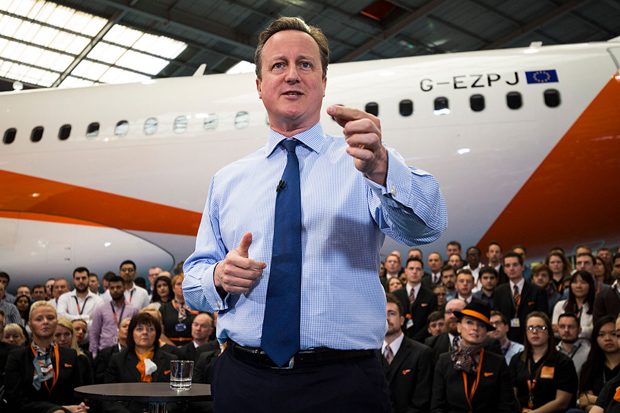Westminster has a tendency to get ahead of itself. MPs want to discuss the aftermath of an event long before it has happened. They play never-ending games of ‘What if?’ At the moment, the political class cannot stop discussing, in great detail, what the post-EU referendum political landscape will look like. The speculation is, in and of itself, part of the political process. Much of the talk of the post-vote challenges facing David Cameron is intended to persuade him to pull his punches in the final weeks of the campaign.
What no one disputes is that the Prime Minister will find governing even harder after 23 June. His majority is already thin and he has had to U-turn on a host of policies since the election. After such a bitterly fought referendum, a handful of Tory MPs will take every opportunity to obstruct Cameron and Osborne’s legislative agenda. It will be very difficult for the government to get anything controversial through the Commons. One member of the payroll vote predicts ‘a zombie parliament’, with hardly any bills being passed. No. 10 is aware of this danger. Its plan, I gather, is to start thinking and acting like a minority government, working out how to do as much as possible without the need to pass laws or win votes in Parliament.
The EU referendum has already told us a lot about the country’s senior politicians, revealing what really motivates them. This does not happen in general elections because party loyalty, and the need to defeat the opposition, keeps the show on the road. And it has, perhaps, told us more about David Cameron than it has about anyone else. Take his decision to promise the referendum. His friend and former adviser Steve Hilton describes this as his throwing Britain a lifeline to escape the sinking EU. But it turns out that the Prime Minister saw the referendum as an exercise in pragmatic party management rather than an attempt to secure radical reform. At every opportunity Cameron has emphasised the risks of leaving. During the election campaign, he declared that ‘taking a risk, having a punt, having a go: that pumps me up’. But the Cameron we see now uses ‘risk’ only as a pejorative.
One Remain-supporting cabinet minister remarks that the referendum has revealed a divide between ‘people of government and more oppositional types’. Cameron himself is the consummate man of government. Tellingly, the iconoclasts whome he has allowed into his inner circle over the years — Hilton and Michael Gove — are for Leave. Without their influence, he has been a far more conventional, establishment politician. His arguments are not notably different from the one we hear from the grand panjandrums who dominate the Britain Stronger in Europe board. It looks as if this approach will win him the referendum. But it is not likely to deliver the type of victory that would settle the question for a generation.
The referendum has also told us something important about Jeremy Corbyn: he too is a more pragmatic politician than people realise. Corbyn is a Bennite, and as such has been hostile to the European project for his whole political career. But as leader, he has dutifully gone along with Labour’s pro-EU line. This shows he is not a political purist; he knows that he can only afford to take on his MPs when he feels sure he has the party membership behind him.
Someone unafraid to cross many of his own MPs is George Osborne. The Chancellor has campaigned vigorously for Remain, using the full force of the Treasury at every opportunity. This isn’t how you would behave if you were interested only in currying favour with your MPs, almost half of whom are for Leave. Indeed, Osborne’s passionate defence of the EU does rather confound the caricature of him as a Machiavelli who cares only for his own advancement.
His conviction that EU membership is vital stems from his belief that size matters. He argues that the EU’s size means it can make a difference both in terms of trade and sanctions. One of those closest to him puts it differently, arguing that in the modern world ‘teams matter’ and Britain’s influence is maximised through its membership of international institutions. So if the UK wants to stop the Chinese setting the rules of the global economy, it needs to stay in the EU, as well as the Chinese-created Asian Infrastructure Investment Bank. ‘Got to be at the party,’ explains this confidant.
Theresa May has ended up in the pro-EU camp, but she is almost the definition of a ‘reluctant Remainer’. In the speech setting out her position she spent as much time on what is wrong with the EU as what is right, and she has hardly campaigned at all. By keeping a low profile she has attracted less ire than almost any other senior Tory Remainer.
Then there are the politicians prepared to defy the consensus (and the odds) and back Leave, knowing they are more likely to end up on the losing side. Michael Gove is the most senior member of the government to have done this, confirming his status as the leading conviction politician of our age. The more surprising Brexit campaigner is Boris Johnson. Cameron has implied that Boris is leading the Leave effort for reasons of personal ambition, rather than the national interest. But this fails to acknowledge that the former London mayor wanted a fundamentally reformed EU, only to find that it was not on offer. But has he made that point effectively? When one friend chided him recently for managing to make a principled decision look disingenuous, Boris did not bother arguing back. His decision to back Leave also demonstrates his willingness to defy the received wisdom. He has a journalist’s suspicion of the broad consensus. He also seems to enjoy being on the side of the underdog. Addressing crowds in town squares suits him better than talking to chief executives in ritzy venues.
So this referendum means that the Tory membership will know a lot more about the candidates to be the party’s next leader than they did in the 2005 contest. But no one yet knows what qualities those members will be looking for in their next leader.
Will Britain vote to leave the EU? Can the Tories survive the aftermath? Join James Forsyth, Isabel Hardman and Fraser Nelson to discuss at a subscriber-only event at the Royal Institution, Mayfair, on Monday 20 June. Tickets are on sale now. Not a subscriber? Click here to join us, from just £1 a week.
Got something to add? Join the discussion and comment below.
Get 10 issues for just $10
Subscribe to The Spectator Australia today for the next 10 magazine issues, plus full online access, for just $10.
See James Forsyth, Isabel Hardman and Fraser Nelson discuss the EU referendum at a subscriber-only event in London on 20 June.
You might disagree with half of it, but you’ll enjoy reading all of it. Try your first month for free, then just $2 a week for the remainder of your first year.
















Comments
Don't miss out
Join the conversation with other Spectator Australia readers. Subscribe to leave a comment.
SUBSCRIBEAlready a subscriber? Log in